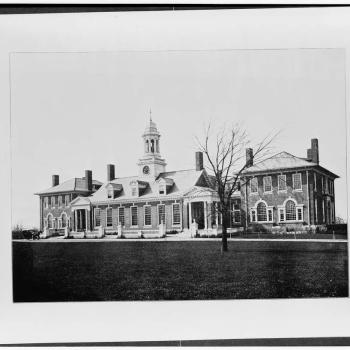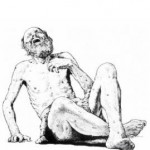Editors' Note: This article is part of the Patheos Public Square on the Faith and Aging. Read other perspectives here.
I am aging—if not gracefully, at least faithfully—as a Christian woman. Nearly half-way through my 70s, I have had a good deal of life's journey in which to explore the significance of faith to my life story. I have been part of the privileged company alongside loved ones in their dying, and I am keenly aware that I am part of a cohort living in the last decade or two of life. I am glad to explore the relationship between the faith that has guided me up to this point, and the process of aging.
Where to begin? In the first place, my Christian faith, resourced by the scriptures of the Old Testament/Hebrew Bible and the New Testament, allows me to see the whole curve of life, from birth to death, as a gift I did nothing to deserve, given me by the great Creator—whose "steadfast love" is attested to throughout the Scriptures and also, of course, in the bounty and beauty of the creation of which we are a part. In this frame of reference, aging is seen as just another stage of life in which to experience "mercies…new every morning" (cf. Lamentations 3:21-24). Each stage of life, including aging and death, can be received with gratitude and hope—as well as with patience and endurance, virtues yet to be further developed as the losses and bereavements and limitations of old age accumulate.
Not only do we age within a general providence that means we never draw a breath outside of the steadfast love of God and within his purposes, but we find also that God is tender toward those who are vulnerable and marginalized, including the aged, declaring through the Old Testament prophet Isaiah, "[E]ven to your old age… /even when you turn gray I will carry you./ I have made, and I will bear; / I will carry and will save" (Isaiah 46:4).
In this view and under this providential framework, old age is not something to be regretted, but a stage of life to be embraced, with a particular value placed on the human body. While the illusions created by the advertising industry would teach us that old age is ugly, to be denied or camouflaged, the time to be whiled away or flirted away, and modern medicine largely treats aging as a cumulative disease process, a very different picture emerges from the scriptures. When the prophet Zechariah describes a city experiencing shalom—a shalom for which we all yearn and to which all responsible government policy should be directed—the old are not hidden away, but integrated in their aged physicality into a bustling intergenerational street scene: "Old men and old women shall again sit in the streets of Jerusalem, each with staff in hand because of their great age. And the streets of the city shall be full of boys and girls playing in its streets" (Zechariah 8: 4).
So understood, I can make peace with my aging body in something of the same spirit in which I once rejoiced in the changes of adolescence (and the changes happen nearly as radically and as rapidly in both seasons of transition, aging and adolescence): this body, made in the image of God and bearing his stamp of loving approval, is doing what it is made to do. Once it grew prepared for fruitfulness; now it prepares for the coming time when it will be, "dust to dust and ashes to ashes," quietly returned to the earth. I meet and counter feelings of exasperation, dismay, and distress by reminding myself that this, too, is known and planned for by Lord of Life "in [whose]book were written / all the days that were formed for me" (Psalm 139:16). Not just my "self," or my "constructed narrative," but also my aging body is located within the loving knowing of the One who gave me life and to whom I will offer it back with my last breath.
My academic work has taken me deeply into the writings of 17th-century English Puritan writers, in whose pastoral works I find a rich and faith-filled view of old age. In these works, directions are given to both the aging themselves and to the community of faith that surrounds them. Aging takes place in a community that supports the old by offering a place in which their continuing identity can be assured, their narratives respectfully heard and received, and their needs, both spiritual and physical, ministered to.
Aging, of course, makes a mockery of our cult of individualism. You might be able to be young and think you can take on the world alone, but you cannot take on old age alone—or, if you attempt to do so, it is a sad and lonely affair. The truth that "no [person] is an island, entire of itself" as John Donne reminded us, becomes abundantly clear in old age. To grow old within a congregation of those who share your faith is to grow old within a goodly company.




